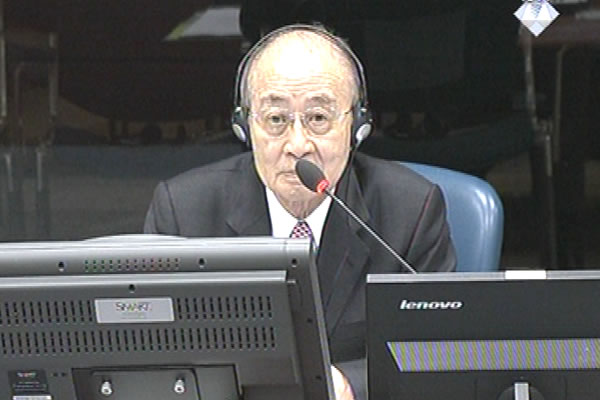Home
'QUANTUM DIFFERENCE' IN CRIMES
As he was questioned by Mladic’s defense, Japanese diplomat Yasushi Akashi said that the Bosnian side was responsible for violating the agreement and refusing to sign ceasefire agreements. In the cross-examination, when the focus turned to the crimes, Akashi confirmed the claim he made in his book, that all three sides in BH had committed crimes. However, Akashi noted, there was a ‘quantum difference’ between the three because only for the Serb side ‘genocide was part of their official policy’
 Yasushi Akashi, defence witness at Rako Mladic trial
Yasushi Akashi, defence witness at Rako Mladic trial Yasushi Akashi, former UN Secretary General’s special envoy to the former Yugoslavia began his evidence as Ratko Mladic’s defense witness. Akashi showed his diplomatic skills as he did favors to both parties. As he was questioned by the defense counsel, Akashi blamed the Bosnian side for the failure of peace negotiations. In the cross-examination, on the other hand, Akashi blamed the Bosnian Serbs and their president Radovan Karadzic for that and more.
In 2013, Akashi appeared as a witness at Karadzic’s request. Parts of the transcript from Akashi’s testimony at that trial were admitted into evidence in Mladic’s case. Akashi had also testified in the defense of Croatian general Ante Gotovina. This was Akashi’s third and final appearance before the Tribunal. Akashi talked about his experience in the region from the beginning of 1994 to the end of the war, during his term of office as the special envoy.
Akashi agreed with the defense that the Bosnian safe areas – Srebrenica, Zepa and Gorazde – were never fully demilitarized and that the BH Army used them to ‘rest and supply’ the troops. According to the defense, the fact that the agreements were not observed and that attacks were launched from the safe areas on the Serb army and civilians legitimized the attacks on them. Mladic is not on trial for the attacks on the enclaves but for the crimes against the local civilian population.
Also, Akashi said that during his term of office the Bosnian side, with the US support, would not sign any long-term cease fire agreements. As he explained, the Bosnian side feared that a permanent ceasefire would formalize the land-grab by the Serb side. At one point, the Serb troops controlled over 70 per cent of the BH territory.
At the beginning of the cross-examination the prosecutor stressed that the Bosnian side and president Alija Izetbegovic maintained that there could be no peace agreements at a moment when the Bosnian Serbs held large swathes of the territory, including 15 municipalities with a Muslim majority. That would mean ‘rewarding the ethnic cleansing’, Izetbegovic told Akashi in February 1994. The witness admitted that he ‘understood what bothered them’.
The prosecutor reminded Akashi of the claims he made in his book In the valley of peace and war that all three sides had committed crimes, although there was a ‘quantum difference’ between them because Serbs committed‘the most horrible acts’. ‘Genocide did not form part of official Bosnian government policy in a way that it clearly did with the Serbs’, Akashi quoted general Rose's comments. Today Akashi confirmed his view.
Akashi repeated the claims he had made in his evidence in the Karadzic case, that Republika Srpska had a ‘tendency to nonchalantly bend the truth’. Today Akashi added that he and other representatives of the international community, including Russian diplomat Vitaly Churkin, were ‘disgusted’ at Karadzic’s habit of promising one thing and then proceeding to do something completely different in the field.
Yasushi Akashi's cross-examination will continue tomorrow.
Linked Reports
- Case : Mladic
- 2015-11-19 SARAJEVO CIVILIANS LACKED ‘SAFETY CULTURE’
- 2015-11-18 ‘PLAGIARISM’ IN MLADIC’S EXPERT REPORT
- 2015-11-17 EXPLOITING ISLAMOPHOBIA IN TRIBUNAL’S COURTROOM
- 2015-11-24 AKASHI'S 'THINKING OUT LOUD' ABOUT MLADIC
- 2015-11-25 EVERYONE IS TO BLAME FOR SREBRENICA GENOCIDE EXCEPT MLADIC AND KARADZIC
- 2015-11-30 HISTORIAN CORRECTS GRAMMAR
